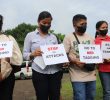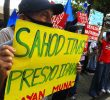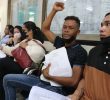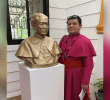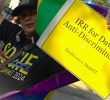MANILA, Philippines — Bayan Muna today lambasted the Philippine National Police (PNP) over
what it called as the Gestapo-style arrest of an activist pastor of the United Church of Christ in the Philippines (UCCP) on Sunday.
“Pastor Guerrero is a victim of police brutality, of a terrible violation of his rights,” said Bayan Muna General Counsel Neri Javier Colmenares. “He must be freed immediately to the warm embrace of his family.”
According to Colmenares, “the modus operandi of the PNP last Sunday
was illegal at almost every step. The four abductors were not in
uniform. They did not introduce themselves as officers of the law.
They used guns, pointed it at him and one of the assailants hit the
pastor in the nape. They then dragged him to one of the vans with
covered plates.”
“If this is not abduction, we do not know what it is. It cannot even
pass as a legitimate arrest or serving of a warrant under the Revised
Rules of Criminal Procedure,” said Colmenares. “Even if a warrant is
produced later, Pastor Guerrero was deliberately hidden from his
family and lawyers, effectively depriving him of his rights under the
law.”
Said Colmenares: “The PNP’s illegal actions against Pastor Guerrero
provided the nation and the world a compelling proof against the PNP
insofar as extrajudicial executions and enforced disappearances are
concerned: That the PNP does abduct citizens, take them forcibly
using unmarked vehicles and hide them from family friends and
lawyers.”
“Parang death squad ang pagkilos,” said Colmenares, adding that the
abductors and their commanding officer may be held liable in
administrative, criminal and civil cases.
Rule 113 Section 7 of the Revised Rules of Criminal Procedure states
that “When making an arrest by virtue of a warrant, the officer shall
inform the person to be arrested of the cause of the arrest and the
fact that a warrant has been issued for his arrest, except when he
flees or forcibly resists before the officer has opportunity to so
inform him, or when the giving of such information will imperil the
arrest. The officer need not have the warrant in his possession at the
time of the arrest but after the arrest, if the person arrested so
requires, the warrant shall be shown to him as soon as practicable.”
Section 14 meanwhile states that “Any member of the Philippine Bar
shall, at the request of the person arrested or of another acting in
his behalf, have the right to visit and confer privately with such
person in the jail or any other place of custody at any hour of the
day or night. Subject to reasonable regulations, a relative of the
person arrested can also exercise the same right.” (davaotoday.com)

